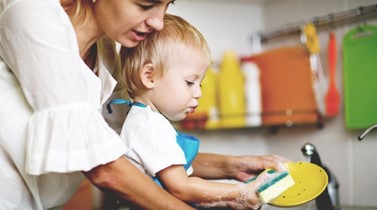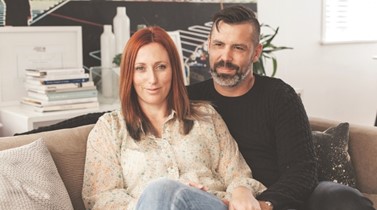How to heal after a bittersweet birth

Babies often enter the world amidst circumstances that weren't on their parents' birth plan. Michelle Parkinson looks at how women feel after giving birth, and how they can heal.
I was really keen to have a natural birth for my first child seven years ago. I planned to give birth in the pool at Birthcare, with no drugs. It was going to be a gentle natural birth to welcome our first-born into the world. However, what I ended up with was 18 hours of intense labour and then an emergency Caesarean section. I was, of course, delighted to have my healthy happy baby in my arms, but inside I felt like I had failed, and I felt ashamed that I hadn’t been able to give birth the ‘natural way’.
A couple of years later, as I was exploring topics to research for my Masters in Counselling, I realised I was intrigued by women’s disappointing experiences of birth. I was really interested in my own feelings of failure, and in how others responded to me regarding that experience. Some people were surprised by this choice of topic, and seemingly confused – how could birth be ‘disappointing’ so long as you ended up with a healthy baby at the end? Some people reacted indignantly, commenting that birth wasn’t supposed to be about how women felt. But many women responded enthusiastically, eager to share their stories and feelings about a birth experience that was negative for them.
I interviewed six women who identified as having had a disappointing birth experience. I listened to their stories, analysing them to find common themes. It was wonderful to hear their personal stories and to find shared experiences and feelings. All the women had given birth to healthy babies. Key areas that contributed to negative feelings emerged; things that physically went ‘wrong’, a birth experience that didn’t match with expectations, and issues relating to the treatment given by the various people involved in a birth.
Expectations and reality
The discrepancy between what a woman wanted and expected for her birth, and how the experience played out, was key in how a woman assessed her birth experience. What were women led to believe would be possible? What things did they expect to be within their control? Birth plans are often prepared in antenatal classes, or with a midwife leading up to a birth, but they were identified as being problematic. Some women felt that their birth plan had set them up to feel like a failure when things didn’t transpire as they had hoped. Creating a birth plan implied an ability to control the minutiae of the birth process. Women would choose things like the music they wanted to labour to, the incense that would be burning, and of course where and how they wanted to have their baby. But if things spiralled out of control and the birth plan had to be abandoned, there was a sense of loss for the experience that they weren't able to have.
Some women described having an over-confidence in themselves and their bodies during pregnancy. They believed that they would be able to handle the pain of childbirth. They felt capable, strong, and well prepared, which actually led to disappointment when the reality was more challenging than their expectations.
Comparisons with others were a common problem as well. Women compared themselves to sisters or friends, wanting and expecting to have the same kinds of experiences as they did. One woman spoke of two friends who had had 'perfect births', like they’d “done a yoga pose and out baby popped”.
Another said her mother had had “five children with no epidurals or anything” and it felt natural for her to want and expect the same thing for her own birth.
She was deeply disappointed when she had needed medical intervention and had ended up agreeing to an epidural. “I was ashamed to tell my mum that I’d had an epidural, because I wanted to say that I’d done as well as she had.”
Getting things right
Many of the women were disappointed when they perceived a failing in their body’s ability to birth the ‘right’ way, and when they found they couldn’t control what was happening to them during the birth. Some women seemed to hold a subconscious belief that a ‘real woman’ should be able to push a baby out under her own strength. It was like their performance in birthing their child was a measure of their womanhood. There was a theme in these women’s stories of working hard to prepare for birth by; reading books, attending classes, exercising and eating well. They spent energy and time preparing for birth like they might for an exam. They felt if they did the work required they would get the result they wanted. One woman said “I’d done all these nerdy things that I thought would ensure the perfect outcome”. The mothers I spoke to remembered a sense of confidence as they prepared for the birth but then, as things started to deviate from the plan, they felt suddenly out of control. When the birth didn’t go the way they hoped, and their body didn’t do what was expected, it was a shock. “It was the first time in my life that something was that out-of-control”, one woman remembered.
In New Zealand, relatively few women have seen a birth first-hand before they are faced with giving birth themselves. They are unprepared for the scope and reality of what a ‘normal’ birth can look like. When a woman starts her journey towards birth naively, and then begins to aim for the kind of birth she heard that her friend/sister/mother had, and is given messages from multiple sources that if she does the right things to prepare then she will achieve her birth plan, she can feel shocked, robbed and lied to when she 'fails'.
Interestingly, a birth might seem normal or routine to a midwife or Plunket nurse – or even another mum – and yet can feel like a disaster to the woman who experienced it. Often we find ourselves unpredictable in our felt responses to life’s curve balls.
Medically speaking
Along with a lack of control over their own bodies, some women were disappointed in their lack of control over the medical processes around giving birth. They felt ignored or disrespected by the medical professionals they dealt with. One woman commented that she knew she was supposed to be giving informed consent to every procedure but she felt she was only able to give terrified consent. The reality is that many interventions are required urgently, and there isn’t the time for prolonged conversations about the risks and any alternative options, which can leave a woman feeling rushed, confused and powerless. This is not a criticism of the medical profession – but it does have a strong bearing on how a woman perceives her birthing experience.
One of the specific things that was described as being disappointing was having a medicalised birth where immediate skin-to-skin contact with the newborn wasn’t possible. All of the women I spoke with felt that they had been robbed of those first experiences of motherhood – seeing your baby naked, feeling the hot little body on you, still covered with 'slime', or hearing someone proclaim its gender (or discovering it for yourself). These women had lost these moments because they were under anaesthetic, or the baby needed medical attention immediately at birth, or they had a C-section and had been presented with a neatly swaddled baby after the surgery was complete. Those first moments held real significance for the birthing woman and the loss of those moments was keenly felt.
Time to heal
So what helped women process a difficult or disappointing birth after the event? Talking about it with someone who would listen (preferably someone who could ‘get it’ ), not being dismissed or told “At least you and the baby are okay”, and hearing other women’s stories that were similar to their own all helped. Reading about what had happened to them, or watching videos or TV shows pertaining to birth were also found to be helpful. One woman found watching “One Born Every Minute” cathartic and healing. Several women went back to their GP, obstetrician or midwife for a full de-brief of what had happened to them. For some there was a strong desire to understand the details and nuances of how things had transpired the way they had. Some women found various types of therapy helpful.
A real turning point for me, personally, was having my midwife describe in detail what had happened and having her kindly tell me that it wasn’t my fault, that I had done everything I could have. This allowed me to forgive myself and forgive my body for the way the birth had gone.
Other significant factors in many women’s healing were; the simple passing of time, having a well and happy baby, or having the opportunity to have subsequent children. For women able to go on and have further births, whether that means planning a C-section or trying for a natural birth, it can be hugely empowering. There wasn’t one consistent goal for the women I spoke to about how they wanted to ‘do’ the birth next time, but they did all have clear ideas about how they wanted it to be, or how they wanted to be treated.
Looking forward
I was interested to find out what the women had learned from their experiences, and how those experiences had changed them. Some women felt they would be more assertive next time, starting with choosing a lead maternity carer (LMC) more carefully, making sure they felt like their LMC was a good match for them, and not being afraid to change LMC if they wanted to. They said they would ask more questions, both before and during the labour and birth, specifically about alternative options for treatment, the risks involved if they did or didn’t agree to an intervention, and clarifying the urgency of a situation toassess how much time they had to think a decision over. They spoke of wanting to claim some of the power back.
Many of the women I spoke to had changed in the way they viewed their body; they had a new understanding of the limits of control they had over it, and they expressed a desire to be kinder to themselves - to let go some of the expectations they held for their body to perform a certain way.
Birth is a monumental physical, psychological and social event in a woman’s life, and it is understandable that such an event, if it doesn’t go to plan, can lead to disappointment. Often women will cope with a negative birth experience just fine and it will not become an issue that troubles them, however, a negative birth experience can sometimes develop into postnatal depression, post traumatic stress disorder, decreased self-esteem, relationship difficulties, family issues and even trigger increased anxiety. It is important, therefore, to take a woman’s feelings about her birth seriously.
One of the simplest ways we as a community can help is to be respectful of women’s experiences and give women permission to have feelings – both good or bad – about their births. Offering safe opportunities for new mums to talk and process ultimately helps with healing.
Michelle Parkinson has a Masters in Counselling. She divides her time between caring for her three children and counselling at both an Auckland secondary school and privately through her practice, wainuicounselling.co.nz.

AS FEATURED IN ISSUE 34 OF OHbaby! MAGAZINE. CHECK OUT OTHER ARTICLES IN THIS ISSUE BELOW
















